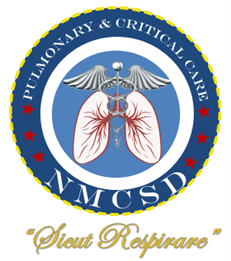ARROWHEAD TRAUMA ICU
- Rotation Director: David Wong, M.D.
- Rotation Location: Arrowhead Regional Medical Center, Colton, CA
- Rotation Duration: One 4-week block
- Trainees/month: One
Educational Purpose and Rotation Description:
The Trauma/Burn Intensive Care Unit at Arrowhead regional Medical Center provides pulmonary/critical care fellows with experience in (1) Management of a diverse group of critically ill adult male and female patients with trauma and burn injuries; (2) Procedural and technical skills necessary for competency in Trauma and Burn Care, including indications, contraindications, complications and limitations of these procedures; (3) Coordinating a multidisciplinary team involving nursing, respiratory therapists, physical therapists pharmacists, and nutritional services; (4) Ethical issues related to Trauma and Burn Care, including palliative care and (5) Administration of the ICU. The fellow is responsible for conducting comprehensive yet efficient rounds, examining, and writing an admission note on each new patient, and supervising resident procedures until competency has been documented.
Rotation Objectives:
- Acquire knowledge of and gain clinical experience in the following clinical areas:
- Management of trauma and burn injuries
- Acute respiratory distress syndrome (ARDS) and other respiratory complications of major trauma and burns
- Fluid resuscitation and electrolyte management in major trauma and burns
- Wound management and infection control in major trauma and burns
- Nutritional support in the critically ill trauma and burn patient
- Pain management and sedation in the trauma and burn patient
- Multisystem organ failure in the trauma and burn patient
- Rehabilitation and long-term outcomes in major trauma and burns
- Acquire knowledge (indications, contraindications, complications, and limitations) of and competence in performing the following procedures:
- Assessment of burn depth and extent
- Escharotomy and fasciotomy in burn care
- Initial management of smoke inhalation and chemical burns
- Wound debridement and dressing changes
- Fluid resuscitation and management of burn shock
- Placement and management of invasive monitoring devices
- Tracheostomy care and management in the burn patient
- Ventilator management in the burn patient
- Burn wound reconstruction and grafting
- Pain management techniques in the burn patient
- Critical care transport of the trauma and burn patient
- Acquire knowledge of and ability to interpret the following diagnostic studies and data pertaining to:
- Burn wound cultures and biopsy
- Radiologic assessment of burns and trauma
- Hemodynamic and respiratory monitoring data in the trauma and burn patient
- Evaluation of burn wound healing and graft take
- Nutritional assessment and monitoring in the trauma and burn patient.
- Pain assessment in the trauma and burn patient.
- Gain additional knowledge, skills, attitudes, and educational experience in the core competency areas of patient care, medical knowledge, practice based-learning, interpersonal and communication skills, professionalism, and systems-based practice by doing the following:
- Functioning in a multidisciplinary ICU team that includes physicians of different training levels, and specialties.
- Communicating with families by phone, in person, and through family conferences when appropriate
- Communicating effectively with consultants from other services to ensure the optimal care of patients for whom the fellow is responsible.
- Learning the principles and indications for organ donation and presenting this option to families of potential donors in a sensitive and empathetic manner
- Learning accepted criteria for brain death and how to explain this concept to family members and friends.
- Ensuring adequate sedation/pain control for all procedures and treatments where physical or emotional stress is anticipated
- Keeping the attending physician informed of significant changes in patient status and recognizing potentially serious findings or trends
- Conducting rounds in an efficient, professional manner
- Communicating patient orders to nurses, therapists, and other personnel in a professional manner and according to hospital guidelines.
- Looking for and identifying socioeconomic and language barriers to medical care
Learning Venues and Teaching Methods:
Direct Patient Care: The entirety of the rotation will take place at the Arrowhead Regional Medical Center
Reading Material:
- Fellows will be expected to have a current ATLS certification prior to beginning the rotation.
- Principles of Adult Surgical Critical Care edited by Niels D. Martin (Editor), Lewis J. Kaplan
Evaluation:
The trainee will receive a written evaluation at the end of their rotation based on cognitive, patient management, procedural and humanistic skills. This evaluation, including areas for improvement, will be discussed personally with the trainee at the end of the rotation and then forwarded to the Program Director for inclusion in the trainee’s permanent file.
